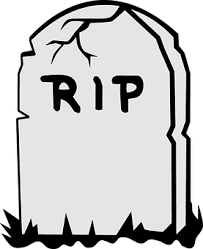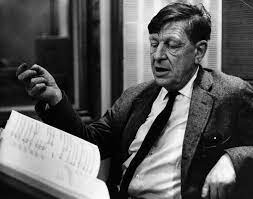Wystan Hugh Auden was a British-American poet. Auden's poetry was noted for its stylistic and technical achievement, its engagement with politics, morals, love, and religion, and its variety in tone, form, and content. Some of his best-known poems are about love, such as "Funeral Blues"; on political and social themes, such as "September 1, 1939" and "The Shield of Achilles"; on cultural and psychological themes, such as The Age of Anxiety and on religious themes such as "For the Time Being" and "Horae Canonical".
He was born in York and grew up in and near Birmingham in a professional middle-class family. He attended various English independent schools and studied English at Christ Church, Oxford. After a few months in Berlin in 1928–29, he spent five years teaching in British private preparatory schools, then traveled to Iceland and China to write books about his journeys.
September 1,1939
The poem starts with the line...I sit in one of the dives
The poet sits in a dive bar on 52nd Street midtown manhattan New York disappointed in the bad decade of the “low dishonest” 1930s. The decade and recent events have consumed people’s private lives. The odor of death “offends” the night of September 1, 1939.
Future scholars will describe how a cultural problem led from the time of Martin Luther A Theologian to the time of Hitler’s hometown of Linz, a pattern that has driven the German culture into madness. Meanwhile, schoolchildren and the average person know well enough:
“Those to whom evil is done Do evil in return.”
The “neutral” New York skyscrapers demonstrate the power of “Collective Man” to accomplish great things, but America is in a “euphoric dream” of neutrality as war breaks out in Europe. America looks “out of the mirror” and sees the face of imperialism and the “international wrong.”
Normal people continue their average American days, keeping up the music and keeping on the lights. Though we make ourselves seem comfortable and at home, we are actually “lost in a haunted wood,” like children who are afraid of the dark and “have never been happy or good.”
The most pompous pro-war speeches spouted by “Important Persons” are not as base as our own jealous wish “to be loved alone.” This is a normal error and not just what “mad Nijinsky wrote About Diaghilev” each person selfishly wants what she or he cannot have.
Commuters come from their “conservative dark” families into “the ethical life” of the public sphere, vowing to improve their lives. Meanwhile, “helpless governors” make their “compulsory” political moves now that war has broken out. Do they have any choice? They seem deaf to advise and unable to speak for those who have no voice.
Yet, all the poet has is his voice, which can expose the lie of neutrality rhetoric and the romanticism of the “man-in-the-street,” who goes along with the authorities and enjoys his “sensual” pleasures. To the poet, there is no “State,” but we are all interconnected and rely on each other. That is, “We must love one another or die.” While the world slumbers, flashes of hope come from “the Just,” exchanging their messages. The poet seeks to be among them, human all the same, troubled by despair but still holding up “an affirming flame.”
The summary video of September 1, 1939
Epitaph on Tyrant
What is Tyrant?
A cruel and oppressive Ruler. Over here Tyrant is connected to Adolf Hitler.
Tyrant = Brutal Dictator

The epitaph on tyrant's simple meaning is Tombstone of a Brutal Dictator.
And the poetry he invented was easy to understand;
He knew human folly like the back of his hand,
And was greatly interested in armies and fleets;
When he laughed, respectable senators burst with laughter,
And when he cried the little children died in the streets.
Wyston Hughes Auden, or WH Auden, was a British poet, often considered by critics to be one of the best England has ever produced. Auden’s work is known, not only for its remarkable poetic caliber and craftsmanship but also for his skillful portrayal of myriad themes- ranging from the political, social, ethical, to the moral and even the individual.
One of Auden’s best-known poems and written, interestingly when Adolf Hitler was at the peak of his power in Europe, is a short, six-line piece entitled- “Epitaph on a Tyrant.”







No comments:
Post a Comment